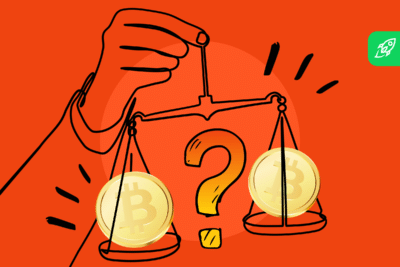beginner
Are you curious about Bitcoin mining and its legal implications?
As cryptocurrencies become more mainstream, there has been an influx of interest in Bitcoin mining. Many people choose to commit their time, money, and energy to this new digital gold rush. However, some very important questions come with all the hype surrounding Bitcoin mining: Is it legal? In this blog post, we will examine various aspects of Bitcoin mining legality as well as other key points that miners should consider.
Read on to learn more about the laws governing crypto-mining operations around the world!
What Is Bitcoin?
Bitcoin is a revolutionary technology that provides a new way of transferring money. It is an online currency with no physical form, and unlike traditional currencies, it is not controlled by any bank or central authority. The Bitcoin network consists of individual users who are connected to process and verify transactions, making Bitcoin secure and trustworthy.
Transactions within the Bitcoin network require no middleman; instead, users interact directly with each other to conduct secure transactions at a fraction of the cost of normal banking fees.
Overall, Bitcoin is changing how people access and transfer money around the world, granting users more control over their finances than ever before.
How Does Bitcoin Mining Work?
Bitcoin mining is an innovative method of generating new Bitcoins by using computing power to solve complex cryptographic hash puzzles.
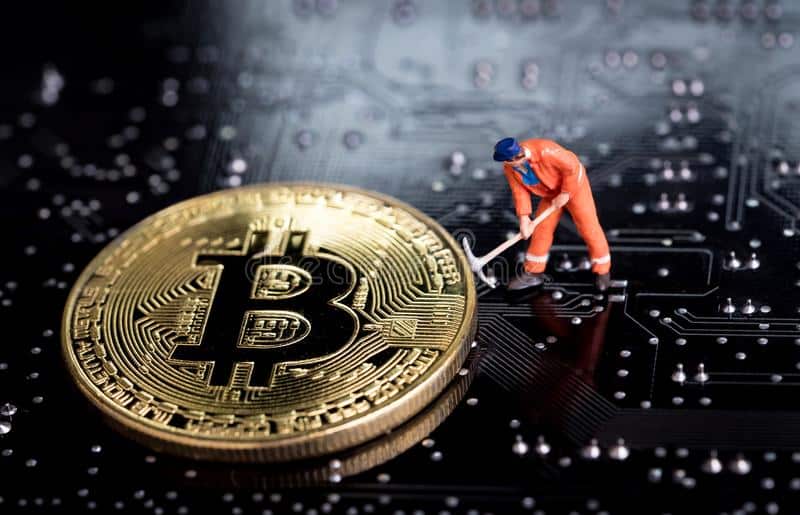
This proof-of-work verification process, also known as “mining,” requires miners to compete with each other to find the next block in a long chain of bitcoins, and when they do, they are rewarded with newly generated coins. It’s like a race against time — miners have to be the first to solve the mathematical puzzle and add the next block to the Bitcoin blockchain. If they do it, they gain rewards in the form of newly “mined” coins. This proof-of-work mechanism keeps track of who owns what coins and enables all users to trust that their transactions will remain secure.
A Bitcoin Transaction’s Components
Three things happen when a transaction is conducted on the Bitcoin network:
- Transactional input
- Transaction output
- The sum of the transaction
A hard-to-decode cryptographic hash problem is created for each transaction submitted by the Bitcoin mining program. Then, it gathers the number of transactions necessary to create a block into the Merkle tree.
The Merkle Tree and the SHA-256 Algorithm
The Merkle Tree and SHA-256 algorithm are two of the most sophisticated technologies implemented in blockchain networks.
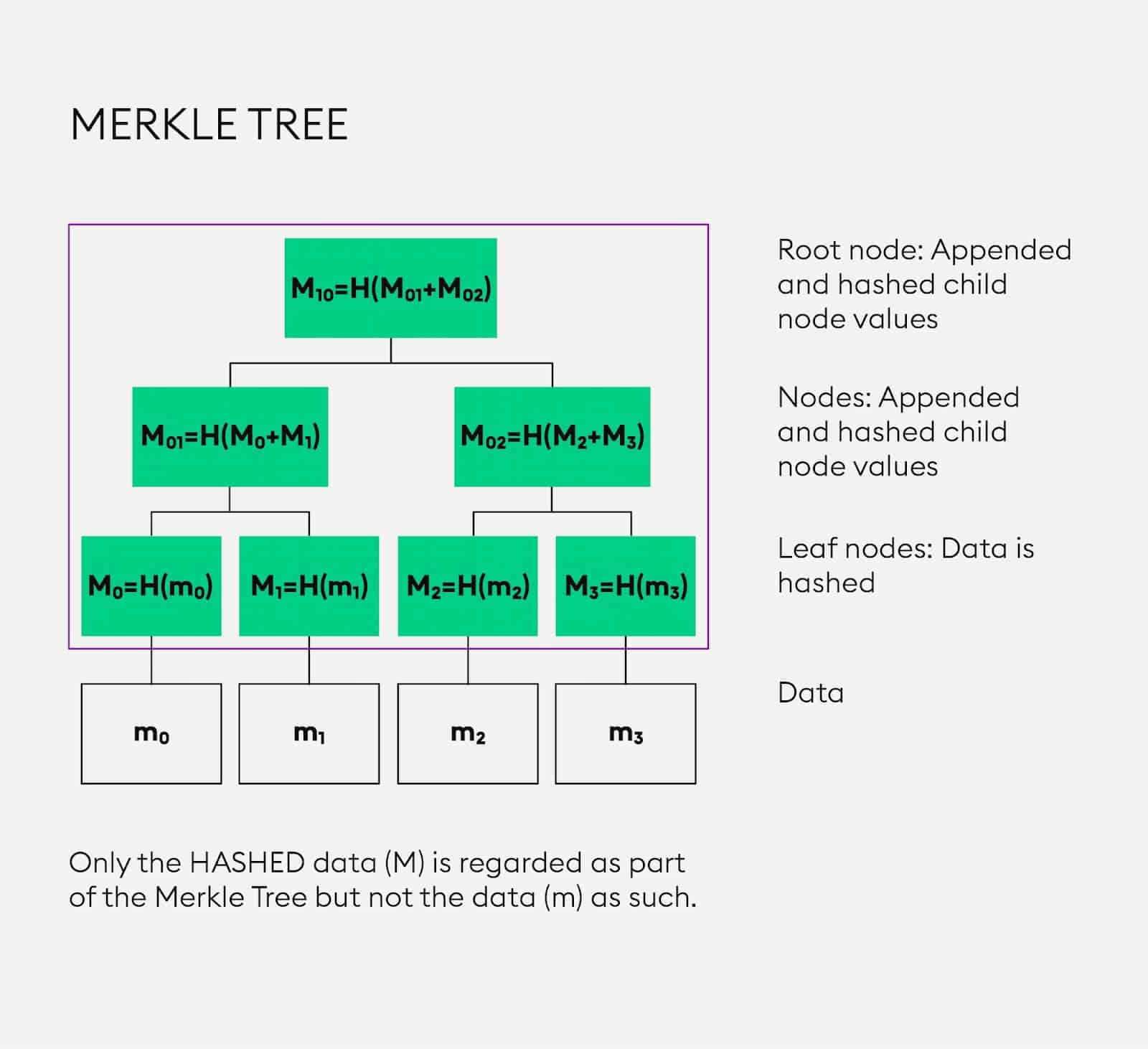
The Merkle Tree was invented to store data in a secure and efficient manner, while the SHA-256 algorithm is used to create cryptographic hashes that help verify the immutability of blockchain records. With these two components working together, blockchain networks become virtually impenetrable, making it impossible for malicious actors to change or tamper with transaction data without being noticed by other nodes in the network. These two technologies not only ensure security but also provide an extra layer of protection for sensitive information stored within a distributed ledger.
Why Do Bitcoins Need to Be Mined?
The Bitcoin mining process is an essential part of the Bitcoin network. It maintains stability and protects the Bitcoin ledger from malicious actors by verifying transactions on the Bitcoin blockchain.
Bitcoin miners are incentivized with mining rewards when they successfully complete a block of transactions, which then gets added to the Bitcoin ledger. These rewards constitute an important source of income for Bitcoin miners and ensure that they have a financial incentive to process Bitcoin transactions.
All of this makes Bitcoin mining an essential part of the overall Bitcoin system, as without it, users would not be able to securely transfer their funds or take advantage of all its features.
What Is Blockchain?

Blockchain technology lies at the core of digital currencies such as Bitcoin and Ethereum.
Blockchain technology is a revolutionary development in the world of digital data storage and security. It is a reliable, distributed ledger system that enables individuals, businesses, and even governments to securely store and transfer data without having to trust a third party or go through complex authorization processes.
This not only allows faster transactions but also increases transparency between all parties since transactions are stored in an immutable, decentralized system. Blockchain can also be used to verify all sorts of transactions, including financial ones such as cryptocurrency, payments, and contracts; operations with physical assets and intellectual property like land titles and copyright, respectively; medical records for doctors and hospitals, etc.
Apart from being efficient and secure, blockchain offers unparalleled opportunities to create innovative solutions for numerous industries, thanks to its unique structure.
Solo vs. Pool Mining
It has grown increasingly difficult for a solo miner to win a block and collect the block reward as the network has developed, and mining has gotten exceedingly popular and in demand. Today, buying a lot of hashing power is the only option for a solo miner to compete, but doing so is quite expensive. Mining enthusiasts can join a pool of miners to continue mining and remain part of the network while making money (or at least covering their costs). Mining pools are groups of miners who cooperate to improve their chances of correctly resolving the necessary mathematical puzzles and, subsequently, mining blocks.
Is Bitcoin Mining Profitable?
The profitability of Bitcoin mining depends on a few key factors, most notably the cost of electricity, the type of Bitcoin mining hardware, and current mining difficulty levels. While mining is often seen as a lucrative venture that can lead to significant financial gains, miners must be aware of its inherent risks and costs.
Bitcoin can also be bought on a cryptocurrency exchange if you don’t want to mine it. Due to its high price, most people won’t be able to buy a whole Bitcoin, but you can buy fractions of it on the exchanges using fiat money like dollars. If you want to buy Bitcoin (or another cryptocurrency) at a bargain price, give Changelly a chance — we’ve gathered all the best rates and lowest fees in one place just for you!
TONY BTC USD WIDGET
How Much Do Miners Earn From Bitcoin Mining?
The block reward and transaction fees incentivize the allocation of computing resources to the network and the continuous energy consumption required for transaction validation. A miner receives Bitcoin as payment for each block they successfully mine.
Bitcoin Halving
The block reward was initially 50 BTC for each block; however, it is now reduced by half every four years. This mechanism will be applied until block rewards exist no more. The block reward today is only 6.25 BTC after being cut in half three times.

Why Does Mining Use So Much Electricity?
Crypto mining is becoming more and more relevant as digital currencies dominate the financial landscape, but why does it require so much electrical power?
The answer lies in blockchain technology, which is the digital backbone of cryptocurrency that allows information to be shared and transactions to be verified. A cluster of computer processors is needed to solve complex mathematical equations and record digital transactions in the blockchain network, making them unchangeable and secure. This means that as digital currencies such as Bitcoin become more popular and hence have more transactions conducted via their chains, additional electricity is consumed.
Therefore, the future of cryptocurrency mining may require more renewable energy solutions with fewer emissions if it is to be sustainable over time.
Is Bitcoin Mining Legal?
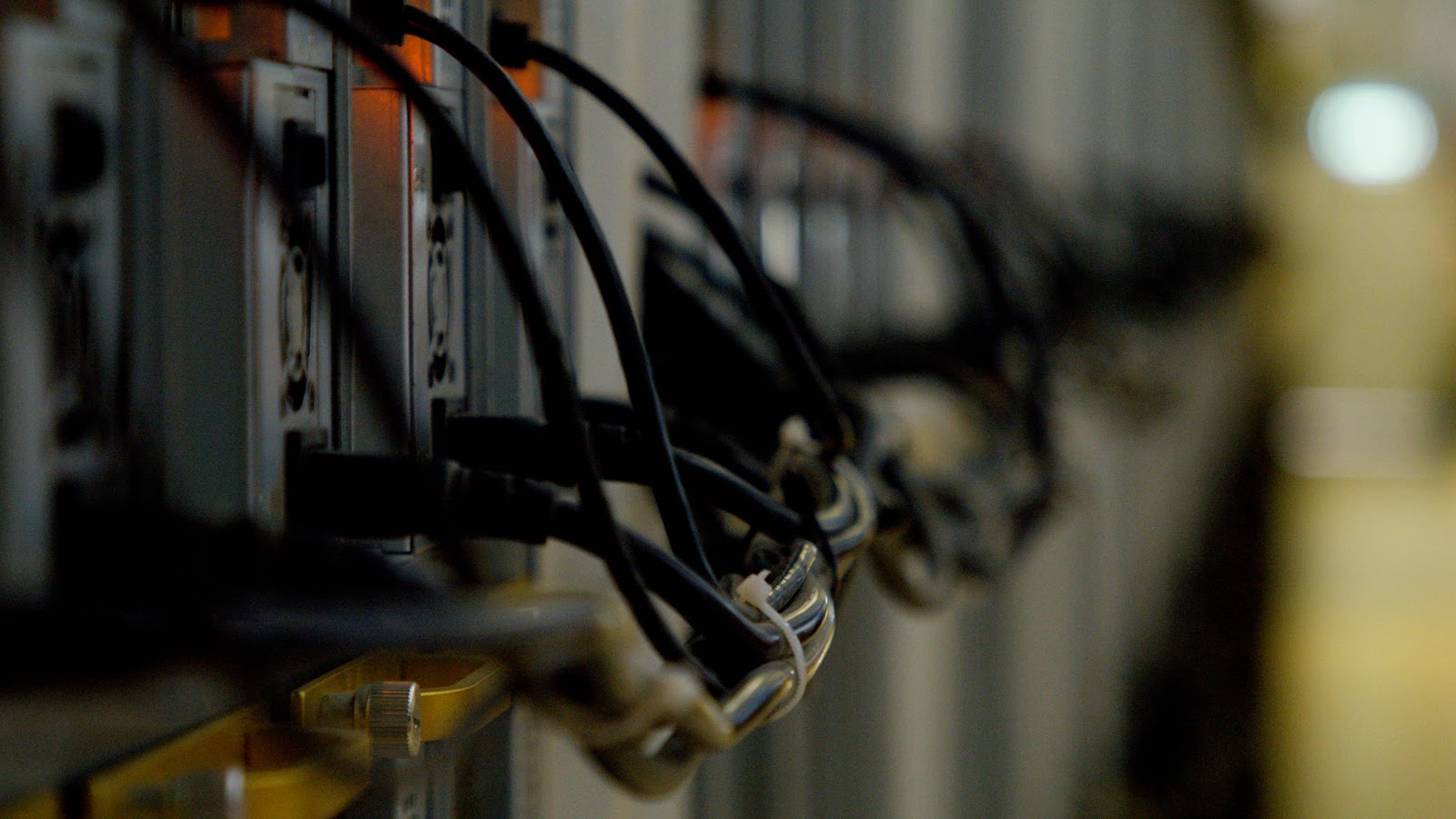
In most cases, crypto miners simply need to be aware of laws regarding the use of electricity and data systems to stay compliant with local regulations. That said, many countries are slowly beginning to introduce regulations specific to Bitcoin and cryptocurrency mining in order to protect investors and set safety standards in this industry.
Is Bitcoin Mining Legal in the USA?
As for the USA, Bitcoin mining is legal in almost all states — New York is the only exception — but some organizations and authorities may impose restrictions.
For instance, the U.S. Marine Corps forbids service members from mining cryptocurrencies using equipment provided by the government. Although the restriction in this instance might be due to security issues, most rules surrounding Bitcoin mining are fueled by worries about energy use.
The mining law in New York, which was approved by the State Assembly and the State Senate in late April and June 2022, imposes a two-year ban on specific cryptocurrency mining operations that employ proof-of-work mechanisms to verify blockchain transactions. Bitcoin and other tokens are created by proof-of-work mining, which necessitates expensive equipment and high electricity consumption.
In November 2022, the law was signed by New York Governor Kathy Hochul. It outlaws some Bitcoin mining companies that use carbon-based energy sources. A proof-of-work mining business will not be allowed to expand, renew permits, or introduce new entrants to start operations for the next two years unless it employs only 100% renewable energy. Time-wise, the law came into force after the governor had given her approval.
This ban could have many consequences. Perianne Boring of the Chamber of Digital Commerce argues that it will ultimately undermine New York’s economy, prompting companies to relocate their offices.
Is Bitcoin Mining Legal in Canada?
Although the USA has not yet adopted New York’s approach, the province of Manitoba in Canada has followed its steps and imposed an 18-month ban on new cryptocurrency mining companies. This is the most recent of several governments to halt or delay the approval of new cryptocurrency mining operations because of concerns that the impact of miners’ load on local communities would be rather negative. Manitoba has the second-cheapest electricity prices in the country after Quebec, which has drawn miners to Canada because of its low electricity costs.
Other than that, there’s no specific blockchain law in Canada that bans crypto mining. Therefore, Bitcoin mining is legal in Canada.
Is Bitcoin Mining Legal in Australia?
Yes, it is legal to mine Bitcoin and other cryptocurrencies in Australia, and doing so should not pose many difficulties. Cloud mining, application-specific integrated circuit (ASIC) mining, and graphics processing unit (GPU) mining are all acceptable across the majority of Australian territory.
Keep in mind that cryptocurrency is not regarded as legal tender in Australia. Therefore, no business is required to accept it as a payment method, and no federal or provincial insurance is available on cryptocurrency funds.
Is Bitcoin Mining Legal in New Zealand?
Yes, Bitcoin mining, as well as mining of other cryptos, is legal in New Zealand.
However, you must pay income tax on any profits you make from mining Bitcoin or other cryptocurrencies. That’s because the Inland Revenue Department (IRD) views cryptocurrency mining as a money-making procedure.
The good news is that you can deduct most of the expenses you incur when mining Bitcoin or another cryptocurrency from your taxes. This includes expenses for hardware, electricity, and the internet.
Is Bitcoin Mining Legal in the UK (United Kingdom)?
Yes, there are no restrictions on Bitcoin mining in the UK, and the same goes for other cryptocurrencies. There is no formal regulatory system that would cover the operations of virtual currency miners.
Customs taxes are levied on imported mining equipment. Furthermore, all mined cryptocurrencies are subject to income tax and social security.
List of Countries Where Bitcoin (BTC) Mining Is Illegal
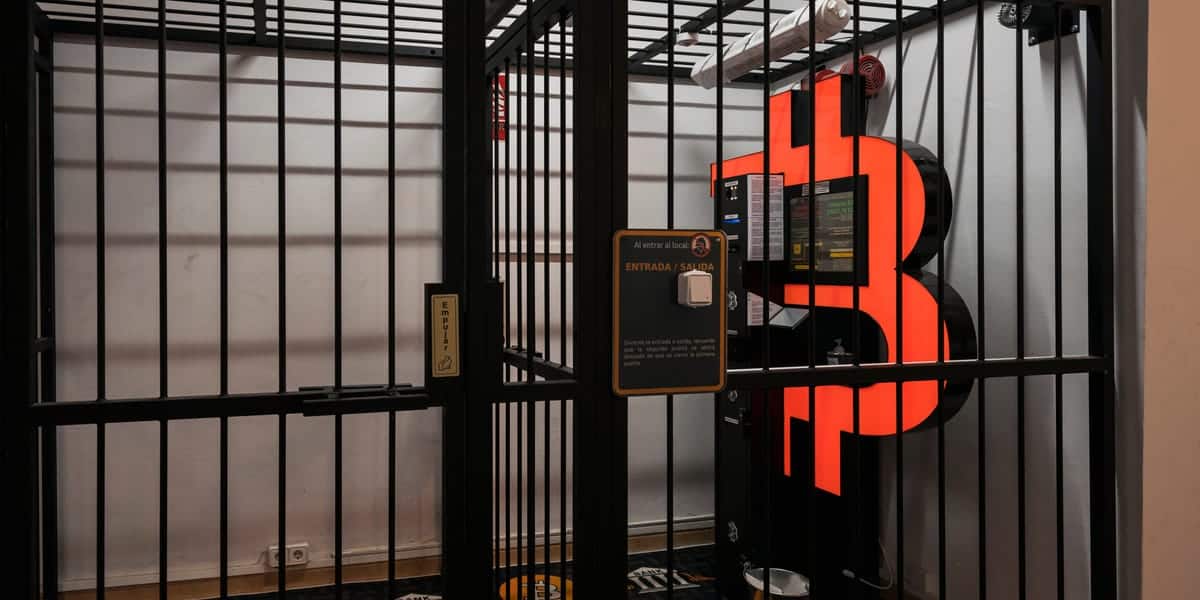
Currently, Bitcoin mining is legal in the United States and the majority of other countries. However, you may want to research local laws where you live.
It is quite simple to list the countries where cryptocurrencies are completely prohibited. According to the U.S. Library of Congress, nine countries have officially outlawed cryptocurrencies. This list includes:
- Algeria
- Bangladesh
- China
- Egypt
- Iraq
- Morocco
- Nepal
- Qatar
- Tunisia
It’s also worth mentioning that, due to energy issues, Sweden advocates for a ban within the EU.
Erik Thedéen, the Vice Chair of the European Securities and Markets Authority, said that cryptocurrencies constituted a risk to achieving the Paris Agreement’s climate change targets and that Bitcoin mining has turned into a “national issue” for his native country, Sweden. “[We call for] the EU to consider an EU-level ban on the energy-intensive mining method proof of work,” Thedéen said in November 2021.
The crypto world is constantly changing, and what’s true today may no longer be so tomorrow. Stay updated with Changelly — subscribe to our weekly newsletter!
EMAIL SUB BUTTON
What are the Risks of Bitcoin Mining?
While the process of mining has many benefits, it also comes with some risks, and legality is not the only issue.
For starters, mining requires huge amounts of electricity, which can be an issue for power companies or countries with limited resources. Additionally, if miners aren’t careful when securing their hardware, it could be hijacked by malicious actors who could use it to mine for their own gain. There’s also the matter of market value; if the price of Bitcoin crashes prior to the validation of mined coins, miners can end up losing substantial investments from expensive hardware purchases.
Furthermore, some experts warn that as more and more people join the mining process, solving increasingly complex algorithms will require even more powerful machines. This may lead to a massive energy drain that could have detrimental implications for global carbon emissions.
FAQ
Still have a question? Don’t worry, Changelly got you covered! Here’re the answers to burning questions.
How long can it take to mine 1 Bitcoin?
Instead of mining one Bitcoin, crypto miners mine one block, with the payout set at 6.25 BTC for each block. It takes 10 minutes to mine one Bitcoin block. This implies that theoretically, mining 1 BTC will only take 10 minutes (as part of the 6.25 BTC reward).
However, it’s crucial to understand that thousands of Bitcoin miners are vying for a payout for each block.
Does Bitcoin mining give you real money?
It gives you a reward in the form of cryptocurrency: when a fresh block of Bitcoin transactions is verified, Bitcoin miners are rewarded with payments in Bitcoin. They can further exchange their crypto coins for fiat money any time they want.
How much does it cost to mine one Bitcoin?
According to Visual Capitalist, on July 15, 2022, the average cost of mining one Bitcoin across 198 countries was $35,404.03, which was more expensive than the market price of one Bitcoin on the same date — $20,863.69. Nonetheless, it’s vital to keep in mind that shifting energy costs and a greater or lesser number of miners on the Bitcoin network alter the required energy and overall cost constantly.
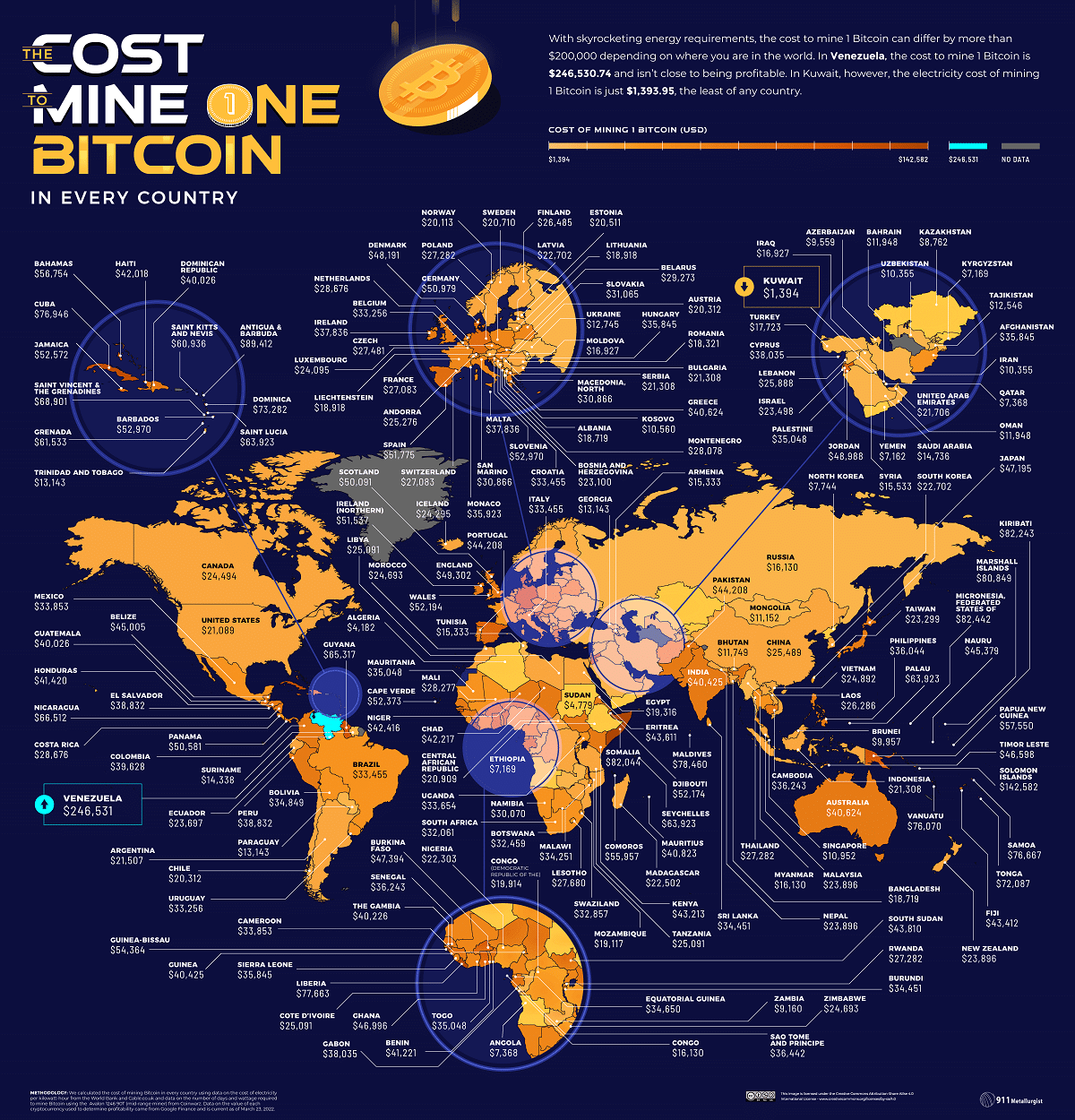
Source: Visual Capitalist. See the higher resolution of this map on this page.
Is Bitcoin mining legal in the USA in 2023?
Yes, Bitcoin mining is completely legal in the United States. Mining other cryptos is not prohibited either. You can learn more about the NY mining law above.
What happens if I mine 1 Bitcoin?
Then you’ll have 1 Bitcoin! Just kidding. Unfortunately, this is an almost impossible situation. Even with optimum hardware and software, which isn’t always accessible (only a select few can afford it), it takes mining pools (not solo miners) a lot of time and energy to compete over winning the race and adding a new Bitcoin block.
However, any rule has exceptions: in January 2023, the battle to add block 772,793 to the Bitcoin blockchain was won by a solo Bitcoin miner with an average hash rate of just 10 TH/s (terahashes per second).
Since the total hash rate of Bitcoin at the time the block was added was just over 269 exahashes per second, the solo miner’s hash rate of 10 TH/s only accounted for 0.000000037% of the computing power used to create the blockchain.
Simply put, it was a very unlikely victory for a solo miner, and this case actually made history.
How do BTC miners get paid?
For confirming a fresh block of Bitcoin transactions, Bitcoin miners receive incentives that are paid in BTC. Miners who successfully validate the block receive a reward of 6.25 BTC. Depending on the market price, this may be a substantial sum.
Who pays Bitcoin miners?
The blockchain pays for Bitcoin mining You may think of the blockchain as a miner’s employer. As a result, the “employer” foots the bill for Bitcoin mining rewards.
Bitcoin mining does not belong to anybody or anything. Then, from where does the reward come?
Bitcoin users are the source of the reward. To pay the miner, the blockchain utilizes some amount of Bitcoin whenever the miner approves your transaction. The blockchain records millions of transactions daily, so there is enough Bitcoin to pay the miners.
Can you mine Bitcoin on your iPhone?
No, Bitcoin mining on the phone is not feasible, at least not in the conventional sense.
How do you join the Bitcoin mining pool?
It’s not difficult to sign up for the Bitcoin mining pool. You can join one by pointing your ASIC to a particular stratum address that the pool provides. We discuss BTC mining pools in detail in this article.
Disclaimer: Please note that the contents of this article are not financial or investing advice. The information provided in this article is the author’s opinion only and should not be considered as offering trading or investing recommendations. We do not make any warranties about the completeness, reliability and accuracy of this information. The cryptocurrency market suffers from high volatility and occasional arbitrary movements. Any investor, trader, or regular crypto users should research multiple viewpoints and be familiar with all local regulations before committing to an investment.

